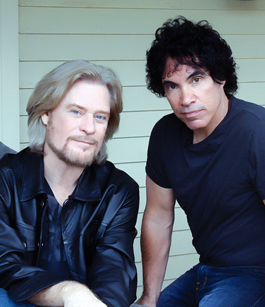home | north bay bohemian index | music & nightlife | band review

YOU KNO YOU LOVE THEM: Daryl Hall and John Oates—ingrained in any radio listener of a certain age.
Back in the Box
Hall & Oates straddle both past and present
By Bruce Robinson
John Oates has been digging deep into his past lately, reviewing his role as half of the phenomenally successful pop-soul duo Hall & Oates. His partnership with Daryl Hall dates back to 1967, when the two aspiring musicians met at a Philadelphia concert, and endures today in a forthcoming four-CD box set, due out in October, which prompted the backward looks.
Through 17 albums over 32 years, including a half-dozen No. 1 hits, the pair explored a number of variations in their blend of folk and R&B influences with crisp hooks, sharp rock guitars, dance grooves, techno touches and—always—tight vocal arrangements.
The evolution of a sound that embodied those disparate elements is traced through the 74 tracks (16 previously unreleased) that have been compiled for the forthcoming box, which even reaches back to include early singles that Oates and Hall each cut with their own early bands before they met, drawn together by a shared love of Philadelphia's famed street-corner harmonizing.
"Doo-wop was an important part of our roots, a little bit more so for Daryl than me," Oates says, settling in to chat from his mountainside home near Aspen, Colo. "My roots were more in folk and traditional American music—bluegrass, blues, acoustic-oriented stuff. When we met, we brought different elements of these roots to each other. If you had to distill what Hall and Oates is, it's a combination of this acoustic Americana mixed with urban R&B."
Still, that distillation took many different forms through the 1970s and '80s before coalescing into the chart-topping sound of albums like Private Eyes, Voices and H2O and such hits as "Kiss on my List," "Maneater" and "I Can't Go for That (No Can Do)." Revising the explorations along that path, Oates says, was full of surprises.
"When we actually had to listen to all these songs, I came away—and I'm not saying this from an ego point of view—pretty impressed with the adventurousness and the unusualness of a lot of the material, especially the stuff we resurrected from the vaults that was never released and live tracks that no one's ever heard."
But through it all, he adds, the basis for everything is their songs.
"Without the songs, we would be nothing, we would never have had a career," he asserts. "For me, the accolades, the No. 1 records, the money—those things are byproducts of the songwriting." And he marks a clear distinction between the song and a recording of it.
"They're two completely different things to me. The song is what happens when you're writing it, you're sitting in your room with an instrument, and the record is what happens when you go into the studio and collaboration occurs between an engineer and musicians and producers and technology. A song can be recorded in a million different ways. Look at the Dolly Parton song 'I Will Always Love You.' Listen to her version and listen to Whitney Houston's version; it's the same song, but they're two completely different records."
Peeling back those studio embellishments was the basic idea underlying Oates' recent series of solo dates, a show he titled The Stories Behind the Songs. "After all these years, so many people know this material and it's become a part of the cultural and generational background, but a lot of people don't know where the songs came from. I think it changes people's perceptions of the songs because everyone, when they hear a song, seems to relate it to their own experience. That song speaks for an emotion or a moment or a feeling," he says intently. "And what I do is say, from our point of view, this is where it really came from."
The relaxed schedule that Hall & Oates maintain now also leaves room for some more unlikely individual projects, like Hall's series of monthly online concerts, Live from Daryl's House, featuring stars like Smokey Robinson performing in Hall's living room and, perhaps more notably, the adventures of J-Stache, an online animated action show, in which Oates, lending his own voice, plays straight man to the distinctive mustache he sported throughout the '70s and '80s.
"I shaved my mustache off in 1989, so when I see that guy, it seems like someone else. It's an animated version of what I used to be, so I can step away from it," he laughs, "and the mustache can be the really insane character."
Daryl Hall and John Oates perform together on Monday, Sept. 7, at Rodney Strong Vineyards. 4pm. $75–$110. 11455 Old Redwood Hwy., Healdsburg. 707.869.1595.
Send a letter to the editor about this story.
|
|
|
|
|
|